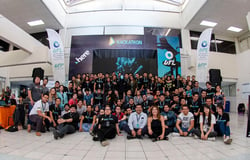We are looking for an experienced software professional to contribute to design and development of accelerated and distributed implementations of Python APIs for numerical computing. In the last decade, Python has become the de-facto programming language for practitioners in AI, data science and HPC, through popular frameworks such as NumPy, SciPy, TensorFlow and PyTorch. These frameworks provide an efficient high-level programming interface, allowing their users to focus on their application while providing highly optimized implementations. NVIDIA has been at the forefront of providing GPU-accelerated implementations of the fundamental components of these frameworks.
Join our dynamic team to help develop and optimize GPU-accelerated and distributed implementations of Python numerical libraries, supporting Python-based frameworks in various ecosystems. This developer will be a crucial member of a team that is working to unlock the power of distributed GPU computing for domains such as scientific computing, data analytics, deep learning, and professional graphics, running on hardware ranging from supercomputers to the cloud!
What you will be doing:
-
work closely with product management and internal or external partners, to understand use cases and requirements, and contribute to the technical roadmaps of libraries
-
architect, prioritize, and develop accelerated and distributed implementations of numerical algorithms
-
design future-proof Python APIs for accelerated numerical/scientific computing libraries
-
analyze and improve the performance of developed APIs on various CPU and GPU architectures, especially as a part of customer-critical end-to-end workflows
-
prototype integrations of developed APIs into targeted frameworks
-
write effective, maintainable, and well-tested code for production use
-
contribute to the development of runtime systems that underlay the foundation of multi-GPU computing at NVIDIA
What we need to see:
-
BS, MS or PhD degree in Computer Science, Applied Math, Electrical Engineering or related field (or equivalent experience)
-
5+ years of relevant industry experience or equivalent academic experience after BS
-
Excellent Python, C++ and CUDA programming skills
-
Strong understanding of fundamental numerical methods, dense and sparse array computing
-
Deep familiarity with Python numerical computing libraries (e.g. NumPy, SciPy), including accelerated implementations (e.g. CuPy, Jax.NumPy, NumS, cuNumeric)
-
Experience developing and publishing Python libraries, following standard methodologies for pythonic API design
-
Strong background with parallel programming and performance analysis
Ways to stand out from the crowd:
-
Experience using/contributing to Python libraries for data science (e.g. Pandas), machine learning (e.g. scikit-learn) and deep learning (e.g. TensorFlow, PyTorch)
-
Experience with low-level GPU performance optimization
-
Experience building, debugging, profiling and optimizing distributed applications, on supercomputers or the cloud
-
Background with tasking or asynchronous runtimes
-
Background on compiler optimization techniques, and domain-specific language design
The base salary range is 148,000 USD - 287,500 USD. Your base salary will be determined based on your location, experience, and the pay of employees in similar positions.
You will also be eligible for equity and benefits. NVIDIA accepts applications on an ongoing basis.
NVIDIA is committed to fostering a diverse work environment and proud to be an equal opportunity employer. As we highly value diversity in our current and future employees, we do not discriminate (including in our hiring and promotion practices) on the basis of race, religion, color, national origin, gender, gender expression, sexual orientation, age, marital status, veteran status, disability status or any other characteristic protected by law.
What We Do
NVIDIA’s invention of the GPU in 1999 sparked the growth of the PC gaming market, redefined modern computer graphics, and revolutionized parallel computing. More recently, GPU deep learning ignited modern AI — the next era of computing — with the GPU acting as the brain of computers, robots, and self-driving cars that can perceive and understand the world. Today, NVIDIA is increasingly known as “the AI computing company.”






